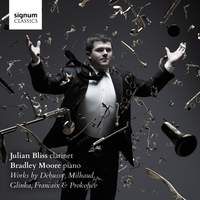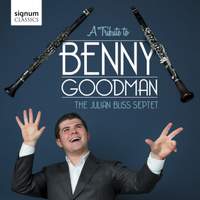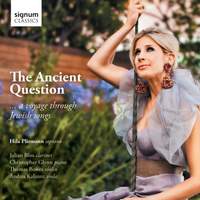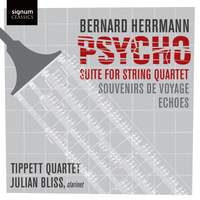Interview,
Julian Bliss on the art of transcription
 Still only in his mid-twenties, British clarinettist Julian Bliss is already a decade into a stellar international career as a recital and concerto soloist, chamber musician and latterly clarinet-designer (the Leblanc Bliss range of instruments was launched five years ago and continues to prove popular with students and professionals alike). His debut solo disc on Signum Classics, A Tribute to Benny Goodman, came out in 2012, and his latest project for the label - a collection of music by French and Russian composers, including several transcriptions - was released on Monday.
Still only in his mid-twenties, British clarinettist Julian Bliss is already a decade into a stellar international career as a recital and concerto soloist, chamber musician and latterly clarinet-designer (the Leblanc Bliss range of instruments was launched five years ago and continues to prove popular with students and professionals alike). His debut solo disc on Signum Classics, A Tribute to Benny Goodman, came out in 2012, and his latest project for the label - a collection of music by French and Russian composers, including several transcriptions - was released on Monday.
I caught up with Julian last week to find out a little more his new disc, talk transcriptions, and discuss his plans for the future…
Looking at the lineup for this album, the most obvious thing that jumps out is the inclusion of both a viola sonata (the Glinka) and a flute sonata (the Prokofiev) on a clarinet disc. How did you approach the process of adapting these pieces to your instrument – both in terms of the arranging and of the performance itself?
>I was already familiar with both works, but after listening to them both very intently, I became convinced that they would both work on the clarinet. The Prokofiev is an incredibly challenging piece and that is what attracted me to explore the possibility of arranging it. I have always been one of those musicians that has wanted to push the boundaries of the instrument and its repertoire.
>The first thing to consider was the range of the original instrument in comparison to the clarinet. To play the Prokofiev as written on the flute, the clarinet would almost constantly be in the upper two thirds of its range. Careful consideration was taken as to where phrases would be more suited to lower registers of the instrument. There was a lot of trial and error. There are points in each movement when I left phrases in the original register to show off the huge range of the clarinet. The Prokofiev has quickly become one of my favourite pieces to play in concert. Every phrase exhibits a challenge for the player not limited to the fact that there aren’t many places to take a breath!
This kind of musical “cross-pollination”, with pieces for one instrument subsequently being arranged for another, is quite rare – perhaps because many people are reluctant to touch established masterpieces. Do you see yourself exploring further down this route?
>Arrangements can be an interesting route to go down, especially for very established works, as everyone is used to hearing them on the original instrument. We instantly associate different with not being as good as the original! This was something I thought long and hard about. To me, there are two ways of coming at arrangements; the first is to try and play the piece in the same way as the original instrument. I mean in terms of phrasing, how notes are shaped, articulation and any breathing constraints.
>The second is to almost disregard how the original is played, and just play it as you would on your own instrument. I am more in favour of the first method as it stays true to the flavour of the piece. When it comes to the big, established pieces such as concerti, on the whole, I think they are best left to the original instrument.
What would you say to a violinist releasing a recording of, say, the Mozart or the Weber clarinet concerti…?
>I would think that they are very brave! Those two are example of masterworks for clarinet and I think it would be hard for any instrument other than clarinet to do them justice, not that I’m biased in any way! Exploring new music, whether it is commissions or arrangements, is part of being a musician. We are always looking for new things to play, not only to explore what is out there, but to give us a challenge. On the clarinet, we are somewhat limited in regards to repertoire compared to the violin or the piano. It is only natural to take risks, look further afield and broaden our repertoire. If you truly believe you can make an arrangement and give a convincing performance, then why not?!
Lately you seem to have been turning more towards chamber music, rather than concerti – is this a conscious decision?
>No, not really. Actually the next album of mine to be released includes 2 of the greatest clarinet concertos written! I equally enjoy playing chamber music and concertos. They require different skills and ways of playing. I like to involve myself with many different types of playing and also different genres. My last album was with my Jazz band, and now we are back to ‘hardcore’ classical. I like to have all of these different things going on at the same time. Playing both jazz and classical I think really opens you up, and helps you to become a more complete musician.
We hear there’s a trio album in the pipeline for later this year, on which you join forces with soprano Ailish Tynan and pianist Christopher Glynn. Can you give us any clues as to what we might have to look forward to on this disc?
>Ailish and I worked together for the opening of the BBC Proms one year, and we got on very well. The atmosphere in rehearsals and on stage was exactly what I would want! We decided we would make an album similar to a 19th-century salon or soiree evening. This album will include music by Schubert, Schumann, Chopin, Brahms and Strauss. It is a great mix of music, and there might be another arrangement or two!
Julian's new disc with the pianist Bradley Moore is out now on Signum: the programme consists of Debussy's Premiere rapsodie, Françaix's Tema con variazioni, Milhaud's Sonatina, and Julian's own transcriptions of Glinka's Viola Sonata and Prokofiev's Flute Sonata.
Available Formats: CD, MP3, FLAC, Hi-Res FLAC
Other recordings featuring Julian Bliss
Julian leads his septet in an homage to one of his heroes, including swing standards such as 'Lady be good', 'Sheik of Araby' and 'Avalon'.
Available Formats: CD, MP3, FLAC
Julian joins soprano Hila Plitmann for a selection of traditional Yiddish songs and Jewish-inspired music by Aharon Harlap, Lori Laitman, Sharon Farber, and Piltman's husband Eric Whitacre.
Available Formats: CD, MP3, FLAC, Hi-Res FLAC
Julian guests with the Tippett Quartet for Herrmann's Souvenir de Voyage, winning praise from the Independent on Sunday for the 'exquisite restraint' of his performance.
Available Format: CD






